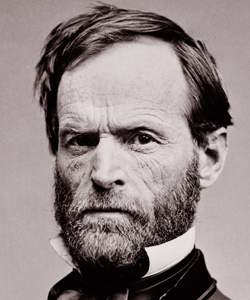William Tecumseh Sherman (American National Biography)
Scholarship
[William] Sherman came out of the war with the success he had always craved. He enjoyed his popularity but wanted only to go back to the army and society as he remembered them before secession. However, the war had changed the United States, and the Reconstruction following the war was a difficult time. Sherman supported the old-line leaders in the South. Though he knew slavery was dead, he thought that the freed people should be kept in a subordinate status. When Andrew Johnson tried to use him in his battle with Congress, Sherman refused to become involved, insisting that the only answer to the imbroglio was a return to the prewar years.
When [Ulysses S.] Grant became president in 1869, Sherman succeeded him as commanding general, a post he was to keep until his retirement. He found the job frustrating. Grant did not support him in his battle with the secretary of war over command jurisdiction, causing a rupture in their friendship that was never totally healed. He was regularly upset as Congress continually cut army strength and military salaries. Politicians ignored his military counsel, even when it came to waging the difficult American Indian wars. As a result, Sherman left Washington whenever he could, spending a year on tour in Europe and the Middle East (1871-1872) and another eighteen months (1874-1876) in St. Louis. He particularly enjoyed visiting the West, and in 1879 he received a friendly welcome when he revisited scenes of his wartime exploits in the South.
When [Ulysses S.] Grant became president in 1869, Sherman succeeded him as commanding general, a post he was to keep until his retirement. He found the job frustrating. Grant did not support him in his battle with the secretary of war over command jurisdiction, causing a rupture in their friendship that was never totally healed. He was regularly upset as Congress continually cut army strength and military salaries. Politicians ignored his military counsel, even when it came to waging the difficult American Indian wars. As a result, Sherman left Washington whenever he could, spending a year on tour in Europe and the Middle East (1871-1872) and another eighteen months (1874-1876) in St. Louis. He particularly enjoyed visiting the West, and in 1879 he received a friendly welcome when he revisited scenes of his wartime exploits in the South.
John F. Marszalek, "Sherman, William Tecumseh," American National Biography Online, February 2000, http://www.anb.org/articles/05/05-00706.html.










